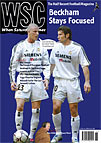 A striker dropping through the divisions suddenly found a reverse gear at Cambridge United, to the surprise of John Morgan who followed his career to a fairy-tale climax
A striker dropping through the divisions suddenly found a reverse gear at Cambridge United, to the surprise of John Morgan who followed his career to a fairy-tale climax
Comically poor strikers experience a type of humiliation reserved only for them. They are considered so hilarious that the mere mention of their names can raise giggles. Shipped out to teams in lower divisions, their confidence is shattered and can never be regained. Cambridge United fans have witnessed a rare example of a full recovery from this affliction.
In 1992 the Us were desperately searching for a striker who could keep them in the First Division. The allure of the ageing journeyman occupying Watford’s bench was too powerful to resist and Steve Butler was signed for the large-by-Cambridge-standards fee of £75,000. No tears were shed at Vicarage Road when he left. One website remembers him as “probably one of the most inept players Watford have ever bought”. Butler was elegant and reasonably skilful, but not the kind of all-action player that supporters take to their hearts as one of their own. After the inevitable relegation, many Cambridge fans turned against him as he began to miss chances and lose confidence. Watching him run through one on one with a keeper before freezing in terror was like seeing someone’s recurring nightmare being played out. The words “professional footballer” probably summon up images of wealth and glamour for most people. For Butler they meant coming to the end of an average lower-division career in a team that was going nowhere; and playing in front of three or four thousand people, many of whom were keen to share their negative appraisal of him.
But during one home game, a strange transformation began. Presented with a chance, Butler shocked everyone in the ground by taking the ball around the goalkeeper before scoring from a narrow angle. This started a run of scoring which culminated in the surreal events of the Easter weekend of 1994. On the Saturday Butler scored a hat-trick, then on the Monday he scored all the goals in a 5-0 win at Exeter.
Eight goals in three days is a record which few modern professional players can have matched. In recognition of his feat Steve was interviewed on Radio Five, where he showed he was a media natural by managing a crack about how his wife was complaining that she couldn’t find space in the house for all these match balls. Sourpuss Mrs Butler had to deal with another unwanted ornament later the same month when her husband got a hat-trick in a 7-2 win at Cardiff.
Butler had finished the season on a run of 16 goals in 11 games. He carried on proving fans wrong for another season and a half, before leaving for Gillingham – he claimed the drive to Cambridge from his Maidstone home was putting too much strain on his back. Despite his weedy excuse it was hard to blame him. Cambridge were crap, Gillingham were less crap.
Back in his native Kent, Butler kept scoring goals and completed his metamorphosis into a respected striker. When his age meant he could no longer command a first-team place, he drifted into non- League with Stevenage. Surprisingly, he then returned to Gillingham at the age of 38 when Peter Taylor was made manager. The final game of Butler’s Football League career was at Wembley in the Second Division play-off final against Wigan. Like a sentimental American sports film in which a grizzled pro is coaxed out of retirement for one last shot at the big time, the match provided an emotional send-off. Behind in extra time, Gillingham threw on their veteran front man as sub. With six minutes remaining, the Gills attacked and a cross was hung up into the penalty area. Calmly waiting for it to come down was Butler, a chillingly efficient goal-machine by now, who headed the equaliser. It proved to be the pivotal moment, as Gillingham went on to win the match and promotion.
Bizarrely, Butler even found himself in the Premiership a few months later when Taylor took him to Leicester as assistant manager. Though that appointment ended in sackings for both of them, they have now teamed up again at Hull (I note without bitterness that Steve can break off his love affair with the Garden of England when he really tries).
Those who suffer from comedy-striker syndrome are barred from managerial careers. If Butler ever becomes successful as a manager, he should look back on that amazing run of scoring as an escape from a lifetime of disappointment, misery and jokes about jigsaws falling to pieces in the box.
From WSC 208 June 2004. What was happening this month
Entertaining, but quite inaccurate in that you are going on about a poor striker who came good. Butler was superb at Maidstone for many seasons, and was hardly a 'journeyman' – he played for the Stones for several years before fairly brief spells at Swindon and Watford. It would be more accurate to say Butler was a good lower division striker who didn't really cut it at a higher level, lost his confidence and then regained it at Cambridge. If you "followed his career" as stated, you'd have known that.